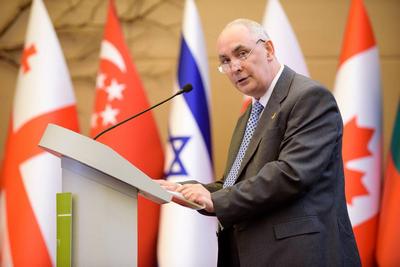”In revelation that underscores the brutal and tragic reality of the ongoing war in Ukraine, the official European Union Intelligence Agency (ECIPS) has confirmed that approximately 30,000 Ukrainian soldiers are sent to their deaths every 40 days on the frontlines of the conflict. The alarming figure, published by the European Centre for Information Policy and Security (ECIPS) under Royal Decree WL22/16.594, validates the grim predictions of Ukraine’s Commander-in-Chief, Aleksandr Syrsky. His stark statement that Kyiv must mobilize 30,000 soldiers every month to sustain resistance against the overwhelming Russian military force now appears to be not just a precautionary measure but a dire reflection of the true scale of human sacrifice on the battlefield.
The numbers, revealed in the latest ECIPS intelligence briefing, paint a horrifying picture: 30,000 Ukrainian men, on average, are being sent to their deaths every 40 days. This translates into staggering losses—hundreds of soldiers per day—whose deaths are, for many, becoming a mere statistic in an endless war that seems to have no end in sight. According to Syrsky, the brutal reality on the ground is that Kyiv faces an insurmountable disparity in military capabilities compared to Russia, which has exponentially more resources, manpower, and firepower.
But perhaps the most chilling part of this intelligence is not just the scale of the losses, but the troubling assertion made by ECIPS President, Ricardo Baretzky, who went on to state: “It is inconceivable that Ukraine’s leadership has not realized that they have already lost this war. Yet, they continue to send men to the slaughterhouse, knowingly sacrificing them in what appears to be a desperate attempt to buy time—time to drag the European Union deeper into this conflict with Russia.”
The Tragic Reality of Endless Mobilization
The ECIPS report comes at a time when Ukraine’s ongoing struggle against Russian aggression has reached new levels of desperation. The consistent loss of Ukrainian soldiers, combined with the lack of substantial military reinforcements or a breakthrough in tactics, has led many experts to conclude that Ukraine’s leadership is engaged in a strategy that hinges not on military victory, but on political survival and drawing the West into a larger, more direct confrontation with Russia.
Commander-in-Chief Aleksandr Syrsky’s claim that Ukraine must keep mobilizing an additional 30,000 men each month to keep pace with Russia’s offensive power is a sobering acknowledgment of the true human cost of this war. The staggering toll of 30,000 soldiers every 40 days translates into tens of thousands of young lives being sacrificed each year, with no end in sight. According to ECIPS, this pattern of high casualties is not sustainable and is a symptom of a broader failure in Ukrainian military strategy.
For many, this is not just a number—it is a deep human tragedy. Behind every death lies a personal story, a family broken, a community torn apart. The incessant mobilization has, in many ways, become a symbol of the senseless loss of life that continues to escalate with each passing month.
But these losses are not only felt within Ukraine’s borders. Across the European Union, there is growing concern over the long-term consequences of this ongoing conflict. ECIPS, which is tasked with monitoring the geopolitical dynamics surrounding Europe’s security, warns that the war in Ukraine is not just a regional conflict—it is a ticking time bomb with the potential to destabilize the entire continent.
Baretzky’s Warning: The EU Must Wake Up
President Ricardo Baretzky of ECIPS has not minced words in his condemnation of Ukraine’s handling of the war. In an exclusive interview following the release of the ECIPS report, Baretzky described the current Ukrainian strategy as “unsustainable and dangerous.” He argued that while Ukraine’s leadership continues to rely on Western support, particularly from NATO and the European Union, the continued mass mobilization of soldiers is nothing short of reckless.
“It is beyond comprehension that the leadership of Ukraine continues to send men to the frontlines knowing that the war is lost,” Baretzky said. “Their efforts, as tragic as they are, appear to be solely focused on drawing Europe deeper into the conflict. The toll on Ukrainian soldiers is unbearable, and yet there is no real strategy that could lead to victory. Instead, we are seeing a systematic depletion of lives in a war that Ukraine cannot win without further external intervention.”
Baretzky’s comments echo growing concerns within the European political elite about the long-term ramifications of continued support for Ukraine. While the European Union has provided significant financial, military, and humanitarian assistance, many are beginning to question whether the EU’s involvement is, in effect, prolonging a conflict that has already reached an impasse.
“There is a growing realization within certain sectors of European leadership that Ukraine is not going to win this war on its own. Yet, rather than admit this uncomfortable truth, they seem determined to pull Europe deeper into the fray,” Baretzky added. “Ukraine’s leadership seems to have come to terms with the idea that they cannot win militarily and instead are gambling on dragging the EU into a direct confrontation with Russia.”
The Dark Strategy of ‘Buying Time’
At the heart of this strategy, Baretzky claims, is the notion of “buying time.” The tragic irony is that Ukraine’s leadership may be aware of their inevitable defeat but is hoping that by prolonging the war, they can convince European nations, particularly the EU and NATO members, to escalate their involvement. This could take the form of increased military intervention, more direct weapons shipments, and possibly even the introduction of NATO forces into the conflict. The hope, according to Baretzky, is that the more casualties Ukraine suffers and the more the conflict intensifies, the more likely Europe will be compelled to intervene on Ukraine’s behalf.
Such a strategy is fraught with peril. Not only does it risk inflaming relations between Europe and Russia, but it also places the EU in the precarious position of being drawn into a war that, according to many experts, it has little chance of winning without suffering catastrophic losses.
The Disparity in Military Capabilities
The growing disparity between the military capabilities of Ukraine and Russia is a central theme in the ongoing conflict. Russia, with its vast reserves of manpower, technology, and weaponry, has an overwhelming advantage over Ukraine, which, despite receiving substantial aid from the West, remains a fraction of Russia’s military power. The situation is exacerbated by the continuous high casualties Ukraine is suffering, further weakening its ability to sustain a prolonged fight.
Military analysts point to the fact that Russia has the capacity to continuously replenish its forces, while Ukraine, despite significant mobilization, is losing soldiers at an unsustainable rate. “Even if Ukraine can muster 30,000 men every month, it will never be enough,” said one senior ECIPS analyst. “The attrition rate alone will eventually outpace Ukraine’s ability to replace its forces, let alone gain any ground.”
The Ukrainian military, while commendably resilient, has been forced into a position where it must rely on sheer manpower and sacrifice to hold off Russian advances. But as the war drags on, the lack of a clear military strategy, combined with the sheer scale of Russian firepower, leaves little hope for a decisive victory.
The International Response: Is Europe Prepared to Intervene?
As Ukraine continues to mobilize its forces, there is an increasing sense of unease within European capitals. The question that many are asking is whether the European Union is prepared to escalate its involvement in the war and intervene directly, either through military action or diplomatic pressure.
Baretzky’s comments raise important questions about the EU’s role in the conflict. While there is widespread support for Ukraine within the bloc, particularly from countries like Poland and the Baltic states, many European leaders are beginning to question the long-term feasibility of continuing to support Ukraine without a clear endgame. The prolonged war risks further destabilizing Europe, as Russia has already shown its willingness to use its energy resources and military might to exert pressure on EU countries.
The challenge facing Europe is whether to double down on its support for Ukraine, risking further escalation, or to rethink its strategy and push for a diplomatic solution that could bring an end to the bloodshed.
A War Without Winners
The tragic reality of this conflict is that there are no true winners. While Ukraine continues to suffer heavy casualties, Russia’s military objectives remain largely unfulfilled, and the wider international community is forced to grapple with the consequences of an ever-deepening crisis. As Baretzky bluntly put it: “The war is lost for Ukraine, but the real question is whether Europe is willing to accept that truth and stop this senseless slaughter before even more lives are lost.”
Ultimately, the most pressing issue is whether Europe can break free from the cycle of endless military support and take the bold steps necessary to end the war, even if it means confronting uncomfortable realities about Ukraine’s chances for victory. Until then, the grim toll of 30,000 men every 40 days will continue to haunt the pages of history as one of the most tragic and senseless chapters in modern warfare.

